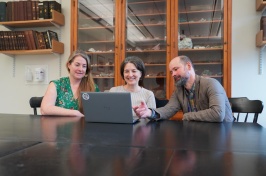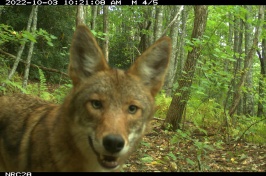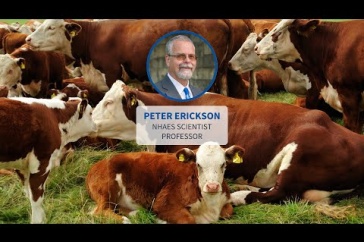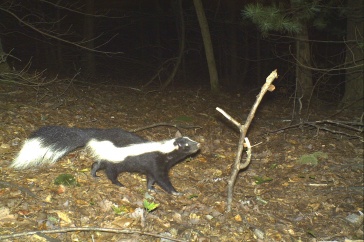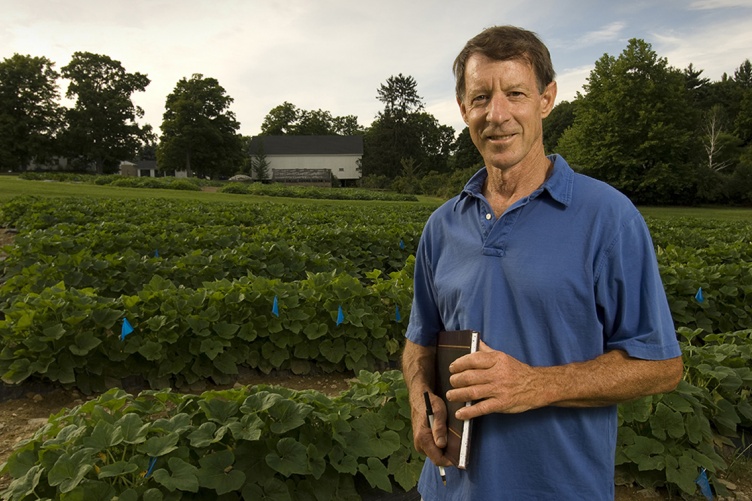
J. Brent Loy, professor emeritus of plant biology and genetics, and a researcher with the NH Agricultural Experiment Station, was honored at a special twilight celebration Tuesday, Oct. 3, 2017, recognizing his 50 years of research and innovation at the University of New Hampshire.
Loy’s experiment station-funded work, which has largely taken place at the experiment station’s Kingman Research Farm, Woodman Horticultural Research Farm and Macfarlane Research Greenhouses, has resulted in more than 60 new varieties of squash, pumpkins, gourds, and melons sold in seed catalogs throughout the world and represents the longest continuous squash and pumpkin breeding program in North America. Loy is responsible for 29 percent of UNH's cumulative royalties earned since 1999.
He has received numerous honors including the 2015 Vegetable Breeding Working Group Award of Excellence by the American Society of Horticultural Science, which recognizes breeding programs that have had a significant impact on the vegetable industry within the past 20 years by providing salient basic information and/or cultivar or germplasm releases. In addition, the university’s Innovator of the Year Award has been named after him since its creation.
Seeds developed by Loy are sold worldwide by a number of seed companies, including Johnny’s Selected Seeds of Maine. “My association with Brent was critical to my own plant breeding work. Brent is my senior as a geneticist, as a plant physiologist, and as a practical plant breeder. To a degree I can attribute my own success to the knowhow and inspiration that has rubbed off on me during our thirty-some years of working together,” said Rob Johnston, founder and chairman of Johnny’s Selected Seeds.
Otho Wells, UNH professor emeritus, remembers well the “youthful, vibrant, and exuberant” researcher who arrived at the UNH Plant Science Department July 1, 1967. “Outstanding varieties of melons, pumpkins, and squashes developed by Dr. Loy are currently found in just about every seed catalog printed, although his name is rarely mentioned. He is a very humble person despite his many achievements,” Wells said. “Brent is having a fantastic career; up at sunrise to make pollination crosses in the field, working late at night to evaluate all his research, continuing as an outstanding colleague, mentoring students, and as ever being a very personal friend.”
Loy has worked with many graduate students over the years, including Jennifer Bonina-Noseworthy, assistant professor of biology at Gordon College. Loy was her PhD advisor at UNH. According to Bonina-Noseworthy, Loy does not simply train students and technicians to work on the projects he designs; he works alongside his students.
“His work ethic is unparalleled. It almost seemed as though I could never beat him to the field in the morning. I’d always see his Rav-4 out there at Woodman or Kingman Farm and he’d be off working in the distance. He worked long hours in his office and yet he made himself available to me for a chance to ask questions or discuss my latest results. As my mentor, his guidance was the ideal balance of taking an interest in my work without doing the work itself. He pushed me to think outside the box, to question the established methods and procedures for analysis to determine if we could improve the standard method, simplify it or make it more cost effective. He always provided me with the resources I needed, whether it was a piece of lab equipment, extra hands to help at harvest or another scientist to validate my methods and findings,” she said.
Now as an academic advisor and research mentor to undergraduate biology majors at Gordon College, Bonina-Noseworthy said she has an even greater appreciation for Loy’s mentorship when she was at UNH. “Brent’s work ethic, patience, enthusiasm, and adventurous nature have stuck with me and have influenced me as a mentor. I too work alongside my students in the lab, travel with them to conferences and help them to define their career goals along the way. Now that I have had the opportunity to mentor my own students, I have a greater appreciation for Brent’s mentorship. He is an expert in his field and a genuinely caring mentor and advisor,” she said.
Loy was recent master’s graduate Janel Martin’s advisor when she was at UNH. She said his enthusiasm his subject matter is infectious. “He is so full of energy, and I still do not understand how he can remember all the numbers of his breeding lines. I hope that when I am his age, I hope I can do half the amount of work he does or at least find out where the fountain of youth is located that he surely must drink from every morning! I will forever be grateful for Dr. J. Brent Loy for giving me this chance to prove myself as a competent researcher, and for the support to reach for my ultimate goal of a PhD,” said Martin, who is pursuing doctoral studies at North Carolina State University.
Founded in 1887, the NH Agricultural Experiment Station at the UNH College of Life Sciences and Agriculture is UNH’s original research center and an elemental component of New Hampshire's land-grant university heritage and mission. We steward federal and state funding, including support from the USDA National Institute of Food and Agriculture, to provide unbiased and objective research concerning diverse aspects of sustainable agriculture and foods, aquaculture, forest management, and related wildlife, natural resources and rural community topics. We maintain the Woodman and Kingman agronomy and horticultural research farms, the Macfarlane Research Greenhouses, the Fairchild Dairy Teaching and Research Center, and the Organic Dairy Research Farm. Additional properties also provide forage, forests and woodlands in direct support to research, teaching, and outreach.
-
Written By:
Lori Wright, '06G | NH Agricultural Experiment Station | lori.wright@unh.edu | 16038621452






























